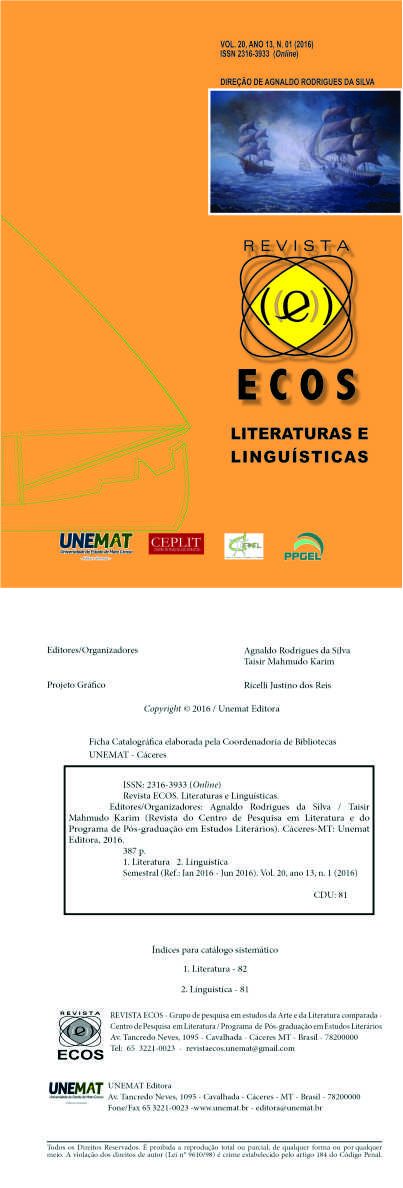DIALOGUE BETWEEN VIDAS SECAS AND GAIBÉUS: A UNIVERSE OF SILENCES / DIÁLOGO ENTRE VIDAS SECAS E GAIBÉUS: UM UNIVERSO DE SILÊNCIOS
Resumo
The article discusses two literary works of the twentieth century, Vidas Secas and Gaibéus. Both novels are an open provocation to the situation in a certain historical period, in the countries of their respective authors. Among them we identify some social, political, economic issues, such as poor working conditions, poverty, hunger, drought, repression and censorship. The last word is related to the novel’s characters’ silencing that somehow represent the society of that time. Graciliano Ramos and Alves Redol capture and represent in their literary works some aspects of that time experienced by both in order to lead the reader to a critical reading of that reality of oppression and retrenchment ideas. About the topic, this article aims to compare the novels Gaibéus from Alves Redol and Vidas Secas from Graciliano Ramos, clarifying similarities and contrasts present in the works. On the analysis of the works and to contribute in an enriching way of the ideas and interpretations were researched some references on some texts as Antonio Candido, Tania Franco Carvalhal, Alfredo Bosi, Theodor Adorno and Afranio Coutinho.
Downloads
Referências
ADORNO, T. W. Teoria estética. Madrid: Taurus, 1971.
BOSI, Alfredo. História concisa da literatura brasileira/Alfredo Bosi. 44ª ed. – São Paulo: Cultrix, 2006.
CANDIDO, Antonio. Literatura e sociedade. 09ª ed. Rio de Janeiro: Ouro sobre Azul, 2006.
CARVALHAL, Tânia Franco. Literatura Comparada. 4. ed. São Paulo: Ática, 2006.
COUTINHO, Afranio. A literatura no Brasil. 7 ed. rev. e atual. – São Paulo: Global, 2004.
HOLANDA, Lourival. Sob o signo do Silêncio. (criação e crítica, v.8) ed. USP, São Paulo, 1992.
MAINGUENEAU, Dominique. Discurso Literário. São Paulo: Contexto, 2006.
MASSAUD, Moisés. A literatura portuguesa. 37ª ed. São Paulo: Cultrix, 2008.
MASSAUD, Moisés. Dicionário de termos literários. 2ª ed. – São Paulo; Cultrix, 1978.
MASSAUD, Moisés. História da literatura brasileira: modernismo. São Paulo: Cultrix, 2001.
MENDONÇA. F. A literatura portuguesa no século XX. São Paulo. Hucitec, 2003.
NUNES, Benedito. O tempo na narrativa. 2ª ed. São Paulo: Ática, 2008.
ORLANDI, Eni P. Análise do discurso. 8 ª ed. São Paulo: Pontes, 2009.
ORLANDI, Eni P. As formas do silêncio. 3. ed. Campinas: Ed. Unicamp, 1995.
RAMOS, Graciliano. Vidas secas. 100ª ed. Rio de Janeiro: Record, 2006.
REDOL, Antonio Alves. Gaibéus.22ª Ed. Publicação: Europa - América, 2011.
ROSAS, Fernando. História de Portugal: Estado Novo. (1926-1974). São Paulo: Círculo de leitores. 1994, 7 v.

